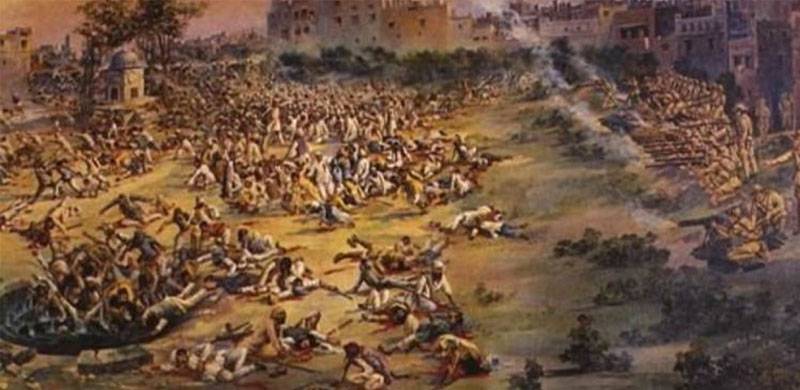
The news of the conditions in Amritsar had reached other cities. Grief and anger were also to be found among people there. There was protest on a big scale in Delhi. There was a strike in Kasur on April 11. People got inflamed and assumed the shape of a mob. The participants of this mob murdered a few European people; tried to burn the Railway Station and other government buildings; destroyed the wire and telephone system. The army was called.
The English administration flogged the people and made arrests. After Amritsar, the greatest hardship came in Lahore. The Chief Administrator of the Martial Law General Johnston had the agitators flogged even there. Meanwhile, 500 students and teachers were arrested in Lahore and they were taken on foot to the Shahi Qila as punishment and then political leaders Pandit Rambhaj, Hari Krishan and Duni Chand were expelled from the district. In Lyallpur (now Faisalabad), the mob of people set fire to the Railway Station, and godowns of Cotton Mills.
As retribution for this protest, all the students of a school in Lyallpur were taken to stand in the ground outside the office of Major Smith. The hands of most of them were tied behind their back, they were asked to pass in a line with bowed heads in front of the major and salute the Union Jack and they had to submit to this order. In Gujranwala people witnessed a strange sight in the morning.
A headless calf was tied to one side of the Railway Station while a dead pig was hanging on the other side. This was a tactic to inflame the Hindus and Muslims, and this was the administration’s doing. So the inflamed mob, which included both Hindus and Muslims set fire to the Railway Station; destroyed the telecommunications system. English administration sought the services of the air force. The planes of the air force bombed Gujranwala and neighbouring villages. A military division fired machine guns to disperse those protesting inside and outside the Railway Station. Similarly, the reaction of the circumstances in Amritsar also occurred in other cities of Punjab. Martial Law had been imposed in five districts of Punjab.
On April 12 the Lieutenant-Governor of Punjab Michael O’Dwyer apprised the Indian government in Simla via telephone about the conditions. In response, it was said, “Even if the army has to fire bullets to control the situation, restraint should not be practiced. An example should be set as to the consequences for rebellious activities”. Therefore as per a government order on April 12 Governor O’Dwyer prohibited all kinds of gatherings and meetings. They had information about a big gathering of Indians in Jallianwala Bagh.
The day was April 13. Given the circumstances in the city, the business of life was suspended. People were all but besieged in homes. Manto’s father was just about to go outside by the big door while giving instructions to the former not to leave the house, when the servant came and informed that despite the Governor’s clear declaration, a public meeting was to be held in Amritsar near the evening.
This was terrifying news, which scared them. The flights of airplanes in the air, the patrols of armed police in the bazaar, the state of sadness on the faces of people, the arrival of bloody storms were the premonition of some horrible calamity. He was thinking about postponing the thought of going outside when the din of airplanes rose, as if several humans are groaning in harmony with the intensity of pain.
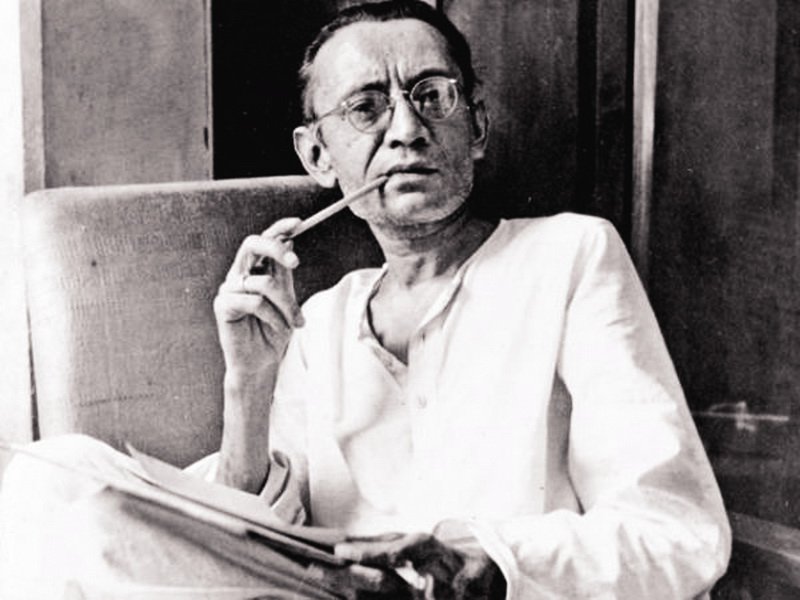
Hearing the din of planes, Manto ran out of the room carrying his air-gun and began to look towards the sky above in hope that should they drop any cannon, he would shoot them down with his air-gun. At that moment, an iron determination was evident on his innocent face. But the plane instead dropped some things from above which bore resemblance to pieces of paper. As soon as they dropped, these pieces flew in the air like moths; then came very near and began to drop in streets, houses and rooftops. A few of these papers also dropped on the upper rooftop of Manto’s home. Manto scampered upstairs and brought back that paper.
‘Abba jan….The plane folks have dropped these slips instead of cannons.’
Ghulam Hasan Manto taking those papers began reading them; they were government advertisements. It was clearly mentioned that the government has not permitted to hold the gathering; if they hold a meeting of their free will, the people themselves will be responsible for the consequences. Ghulam Hasan turned pale. Now he could clearly visualize the picture of the impending calamity. Manto looking at his father, who appeared surprised and worried after reading the advertisement, asked in fear, ‘What is written on them?.....’
‘Saadat, go away now…go play with your gun!’ the father said.
‘But what is written on it Abba jan?’
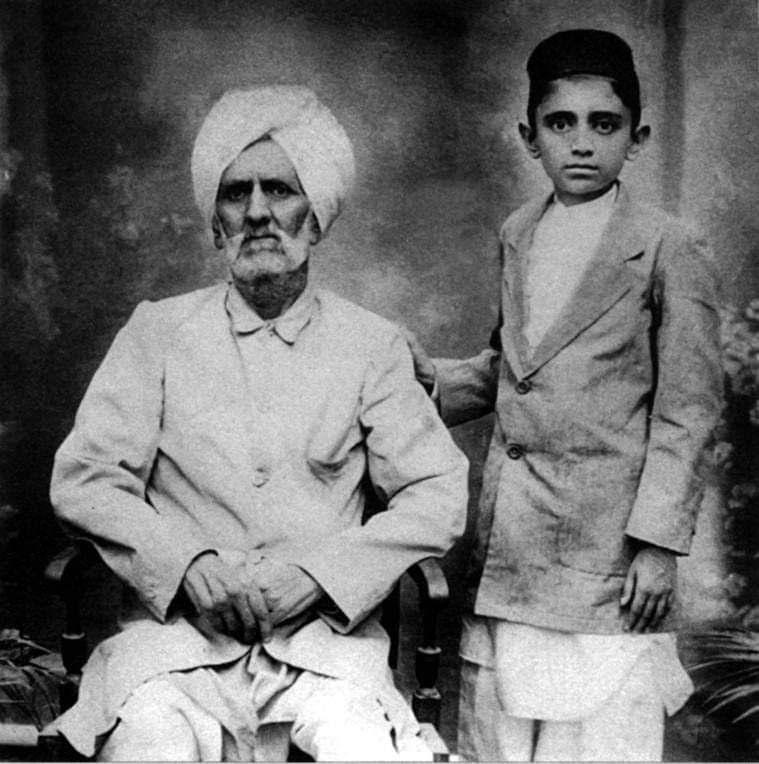
‘It’s written that there will be a show in the evening today’, Ghulam Hasan said to his son in order to delay the matter.
‘There will be a show! Then I will go too.’
‘What did you say?’
‘Can’t I go to this show with you?’
‘Fine I will take you…now go play’, Ghulam Hasan said, afraid to extend the conversation any further.
‘Play where…you don’t let me go outside. Mother and sister do not play with me. My classmate Tufail does not come these days. Who should I play with now? We will definitely go see the show in the evening, right?’
Manto went inside without waiting for an answer and wandering around in the rooms went to the sitting room of his father and began to look outside the window. He saw that the shops in the bazaar were closed indeed but people were going to and fro today. But he was thinking why were the shops closed? Perhaps people have closed their shops in order to see the show, the advertisements for which the plane had dropped. It must be some big show. The very thought made Saadat very restless. He could see people were coming and going. He began to wait with baited breath for the time of evening.
People were coming and going in the bazaars. It was the festival of Baisakhi that day. Even in those very chaotic days, people were gathering in Amritsar from near and far because every year the mela of Baisakhi was celebrated with great fervor and festivity. Manto had not been out to play for the last two to three days. That is why he also never found out from his age mates that the Baisakhi fair was coming.
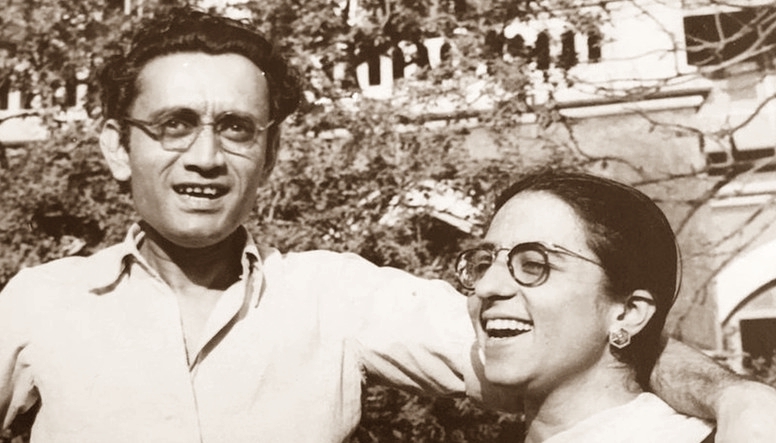
The family-members too did not mention it since he would insist on watching it. The circumstances were not suitable and nobody really knew whether the mela would even be held or not? English historian (Arthur) Swinson has written that ‘That day thousands of people were gathered in Jallianwala Bagh.
There was a festive scene and people were joyously celebrating the festival. Several were lying on the grass of the Bagh. Many were busy playing cards and there were also a lot of people who were busy in fun and sport along with their children and these latter were aged from three to twelve years.’ The garden was gradually getting busier. There were police check-posts on the city routes.
Armed white soldiers were standing at the entrance of the bazaars but people were arriving from everywhere. There were only four narrow gates for entry into the Bagh, which were being guarded lest the evildoers enter. Voices of roaring shouts could be heard. These groups were stopped by the administration with the help of cudgels. Jostling kept increasing at the entry gates. There were protesting cries.
The armed soldiers tried to stop them but the fear and harassment had now disappeared from their faces and instead blood and passion had emerged. At some places these were blossoming in heart-shaking voices. There was a sea of humans inside the Bagh. The dust rose from the feet and hovered over the heads. There was a noise of people and a state of confusion was about.
The Muslims were entering shouting the name of their God and religious leaders and the Hindus and Sikhs displayed passion and fervor calling out to their gods and leaders. This crowd was now getting out of the control of the administration. At a raised position, a Hindu leader addressed. The die-hards repeatedly chanted slogans.
Then a Muslim leader addressed the people from that platform. The English officers having failed in administrative matters were looking angrily at that black-bearded man who was addressing the people by gesturing and screaming. A gora appeared behind him who wore a military officer’s uniform. He threw that black-bearded one down by pushing him and began to say something to the people gesturing in a similar manner.
Silence dominated for a moment and the extremely angry voice of that gora roared. No one could actually understand what he said but it was evident from his gestures and postures that he was asking the crowd to leave and disperse.
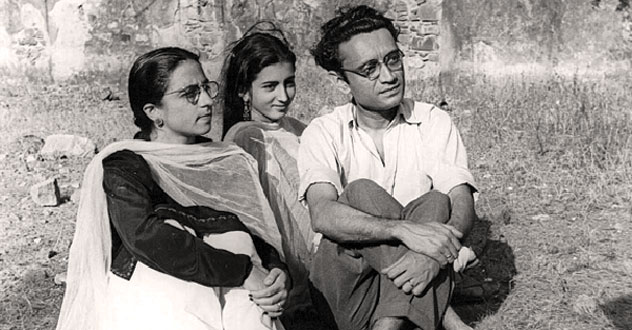
Suddenly a noise rose against him. His voice was drowned. Some crazy man in the crowd took his shoe off and threw in his direction. Then a sudden assault of shoes began from many directions. Alongside, this really huge crowd was also moving. After the shoes, a barrage of balls made out of pagris, shirts and vests ensued. Several people became half-naked, having undressed to fling their clothes at the police authorities.
There was a noise which both the crowd and those army officers were making together. At that time, there must have been 20-25 thousand people in the Bagh. In all four directions of the Bagh, there were high-rising houses, and to enter the high walls of which there were four narrow routes. In the meanwhile, General Dyer entered the Bagh along with his army. The armoured military cars were left outside since they could not enter through these narrow gates. All the routes to the exit, the gates through which the army entered, were closed. It took positions as soon as it reached and immediately loaded the machine guns with bullets as ordered by General Dyer. Swift winds were dissolving into storm. Red winds brought a message of the impending bloody calamity.
The whole city was wrapped in an unknown fear. Ghulam Hasan Manto and his wife were sitting silent in the courtyard of the house. Their son was gazing at them with silent looks sitting with his sister on the charpoy. There was a whistle-like voice in the swift wind.
Trr, trr, trr, trr…
The colour of Saadat’s father’s face became white like paper upon hearing these voices.
He could only manage to utter…’Bullet…’ Saadat’s mother could not utter a single word. The very mention of a bullet had terrorized her. She stood up; so did her daughter. Both went into the room one after the other. Saadat got up from the charpoy and approaching his father held his finger, saying, ‘Abba, get up let’s go the show has begun.’
‘What show?’ Maulvi Ghulam Hasan said in a stern tone.
‘The show about which the slips were advertising in the morning. The mela has begun, you hear the noise of these crackers, right?’
‘There’s still a lot of time. No need to hurry’, the father said, concealing his fear. ‘Now go study inside the room with your sister.’
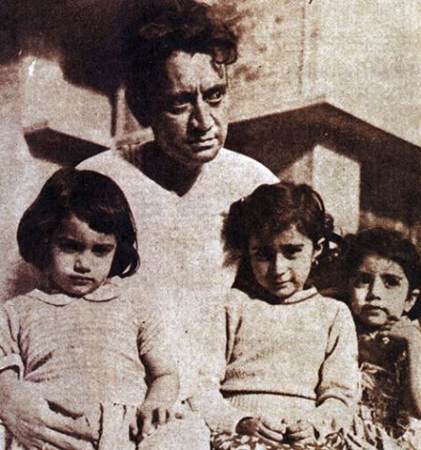
Saadat went towards the kitchen with a disappointed face. Not finding his mother there, he went to his mother and sister in the other room. The firing was going on unhindered, which Saadat thought was the noise of crackers. Over there in Jallianwala Bagh, death was roaring. A scene had begun there, which is rarely to be seen in life. A panic had spread throughout the Bagh and there was chaos.
The crowd was now running here and there in a state of panic; this was a strange sight, no one knew about the other; everyone was running here and there to save their lives. There was a state of hue and cry in the Bagh. The running men targeted by bullets somersaulted in the air; as if they were clowns in a circus falling down during a performance.
The ones who died had the same passion and they would even not be rendered repulsive to sight after death because they hardly even had an idea about death. A strange death ruled. People fell, balanced, and then collided with each other but the pursuing bullets ran much faster than humans. Heaps of those who died and were injured lay at several places in the Bagh and when people headed towards the narrow exit gates, they would have to face a hail of bullets there. The poor souls would fall, injured by the bullets then would try to raise their heads but in the meanwhile would be all but buried under dozens of other injured ones. The white soldiers were firing continuously. Thousands of such people who were disappointed at being unable to leave the Bagh through the exit gates tried to scale the walls. Although at some places these walls were 7 feet high and at others 10 feet. There were many who were successful in clinging to them and were trying to outdo one another in finding a spot above; trying to climb upwards stepping on one another. The army bullets did not even spare them. There was a well towards the left of the Bagh. People running there fell into it. People coming from the other direction fell on them. Then living and semi-dead people coming from everywhere kept falling. Human screams were roaring in the well.
Afterwards while sitting on the capstone of this well Saadat Hasan Manto had felt that incident with his heartbeats and the eye of his imagination and chronicled it. The atmosphere of the Bagh was still roaring with the vibration of bullets and the hue and cry of the running people in his ears. Manto has written in his short story Deevana Shayir, ‘The rustle of dry leaves beneath my footsteps was making a sound like the breaking of dried bones. I felt on every step as if countless corpses are lying on the evergreen bed of grass. I quickened my steps and with beating heart sat on the platform that was constructed around the well.’ While sitting at that well he had met an insane poet who was aggrieved over that injustice and was reminding about that bloody incident.
Manto said to him, ‘I was young at the time of this incident so very foggy traces of it remain in my mind. I have a lot of respect in my heart for these people who had sacrificed their lives for their motherland and passion for freedom. Bullets were raining Trr trr. People were dying over each other fleeing everywhere in horror. Death is gruesome but oppression is many times more terrifying and gruesome!!!’
There were bullet marks on the wall in front of the well and the broken square latticed window. These innumerable marks on the walls seemed as if thousands of bloody eyes are watching. The legs of many men hanging by the walls around the Bagh were turned inwards and the heads and arms were clinging outwards on the corner at the edge of the wall. The Gurkha soldiers had kept them within the hail of bullets from every position. They were those unfortunate ones who had climbed above to scale the wall viewing it to be of a lower height from that point; coming in the range of bullets and upon viewing from the inside appeared as if the dhobi had spread out many different kinds of clothes to dry.
Those who unhesitatingly went out the narrow gate, ripping through the soldiers’ positions in the chaos were being fired upon from the rear. There was a river of human bodies flowing from the Bagh to the bazaar. Those poor ones who avoided the range of bullets had to cross the 25-yard piece of land that went towards the Sabzi Mandi crawling on the ground on their bellies. They were not even allowed to utilize elbows or knees for the purpose. It had been made a law that the people should cross by moving like a snake on their bellies here, where their white women had been treated like a snake. There a row of soldiers taking position were ready to fire bullets all the time. Whoever rose on their elbows would be shot.
Then another tactic was used that bullets were continuously fired a foot or half-foot above the crawling bodies and the people saving their lives stuck their heads in the ground and began to crawl on their toes aided by nails. Whoever got the opportunity would join this crawling crowd of serpents by falling on his head.
Even then some blind bullet would hit a skull and the head sunk in the earth would leave behind a wide line of blood. Despite that, people continued passing by lying down, which was an extremely improper. This was the only single way after getting out of the Bagh safe and sound.
Far in the distance inside the lane from Fareed Chowk, Saadat was looking outside from his window. Evening was setting in. The bazaar was deserted except for the sound of the wind. After momentary pauses, the noise of bullets could be heard, which also included painful voices of humans; though these screams were far from Saadat’s hearing. Suddenly he heard the sound of someone moaning within the silent scene of the window. He was trying to see in an amazement and a quest when a boy was seen coming from the chowk, screaming, running, stumbling; then stumbled badly at the exact opposite to their house and fell. He was injured. Saadat became really scared at this sight, ran to his father and said, ‘Abba abba someone has fallen there in the bazaar. He is also bleeding.’
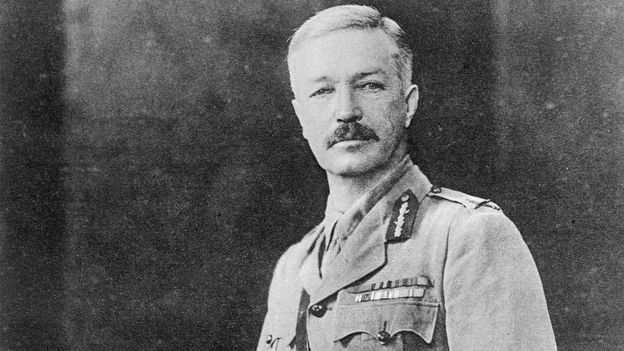
Upon hearing this Ghulam Hasan Manto went to the window and saw that indeed a young boy was lying outside face-down. He had a wound on his calf from which a lot of blood was oozing. But he did not have the courage to go near and help him. He knew too well the horrible conditions outside. The light of some home was lying unconscious, helpless and it occurred to no one to pick up the boy from the road and lay him down on the platform of the shop in front. He remained there gasping, dying.
‘Abbajan, has someone hit that boy?’
The father shut the window and went into the room nodding in assent…. The noise of bullets coming from the direction of the Bagh had abated. Saadat stood thinking how much pain that boy would have felt from such a big wound. As once he could not sleep the whole night due to a prick from a pen-knife; and his parents had sat by his bedside. The moment this thought came to him he felt as if that wound was in his own calf and it had acute pain… his eyes became wet. When his mother came inside, she fondled him seeing him cry, asking, ‘My son why are you crying?’
‘Ammi has someone hit that injured boy?’ He was saying in a bittersweet voice, pointing a finger outside the window.
The mother had heard orally about the injured boy and the conditions outside from her husband. ‘He must have done something wrong’, the mother said to him changing the topic.
‘But in school a mischief or wrong is punished with a cane. It never bleeds’, Saadat said looking at his mother with uncertainty. ‘Won’t his father be mad at the teacher when he goes to the school; whoever has hit him so badly? One day when master sahib pulled my ears so hard that they turned red, Abbajan had gone to the headmaster to complain na?’
‘Bete! The master who hit him is a very powerful man.’
‘Is he even more powerful than Allah mian?’
‘No he is less powerful than Him.’
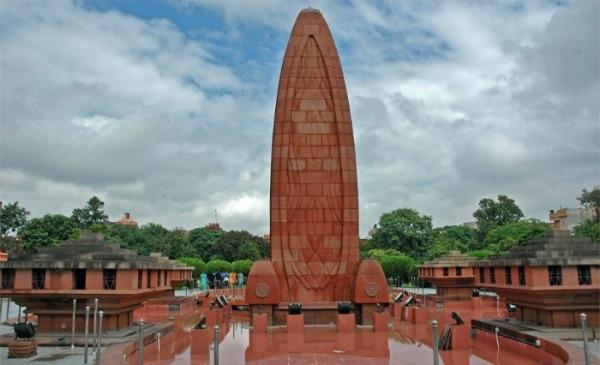
‘Do you know him?’
‘No…. leave this nonsense. It’s night-time. Chalo, let’s sleep’, the mother grabs his arm to take him to the other room to his sister.
‘Allah mian! I pray that the master who has hit that boy, You punish him severely. Snatch such a cane from him which causes bleeding… I too haven’t memorized the tables. So I’m afraid lest my teacher too finds such a cane…if You do not listen to me, then I will be displeased with You too,’ Saadat was praying in his heart as he slept.
A few parts in the aforementioned narrative are derived from Saadat Hasan Manto’s first short-story Tamasha, which Manto witnessed as a kid as the Martial Law of 1919; that Martial Law which is a memorial of the bloody view of Jallianwala Bagh and the brutal tyrannies of General Dyer. There are merely two main characters in Tamasha: father and son (the child’s name in the short story though is Khalid but it is clear from study that it is Manto in the form of Khalid) The conversation in the form of a dialogue between a father and son in the aforementioned pages encompass the personality and psychology of Manto in every way.
In the plot of this short-story carrying the background of Jallianwala Bagh, the citizens of the city were protesting against the ruler of the time and the empire had resorted to extreme oppression and injustice against them. Due to this a strange silence descended over the city for many days in that who knows what might happen in the next moments? The child was asking the father to go see the show, when the sounds of bullets firing began to be heard in the city. Hearing these sounds, the father sent the child to the mother inside. Entering the home, the child saw from the window the injured boy falling outside the house. Saadat Hasan Manto says in the short story that although the boy was seriously injured and lying on the road, out of the fear of the ruler, neither the child’s father nor anyone else dared to help him or at least pick him from the road and lay him down on the platform of the shop where he could lie with comfort or if he had passed away, would have lain aside. Here, Manto indicates another social problem in that official vehicles are indeed used to shift unarmed and poor people to jail; not to shift some poor and injured innocent to the hospital or home, someone who because of the oppression and injustice of these very rulers is staring death in the face. Someone’s son, an apple of someone’s eye, was taken and he was lying dead on the road, targeted by bullets. The death of that young man in such a state was a horrible shape of the cruel bullets in pursuit of the innocent and guiltless.
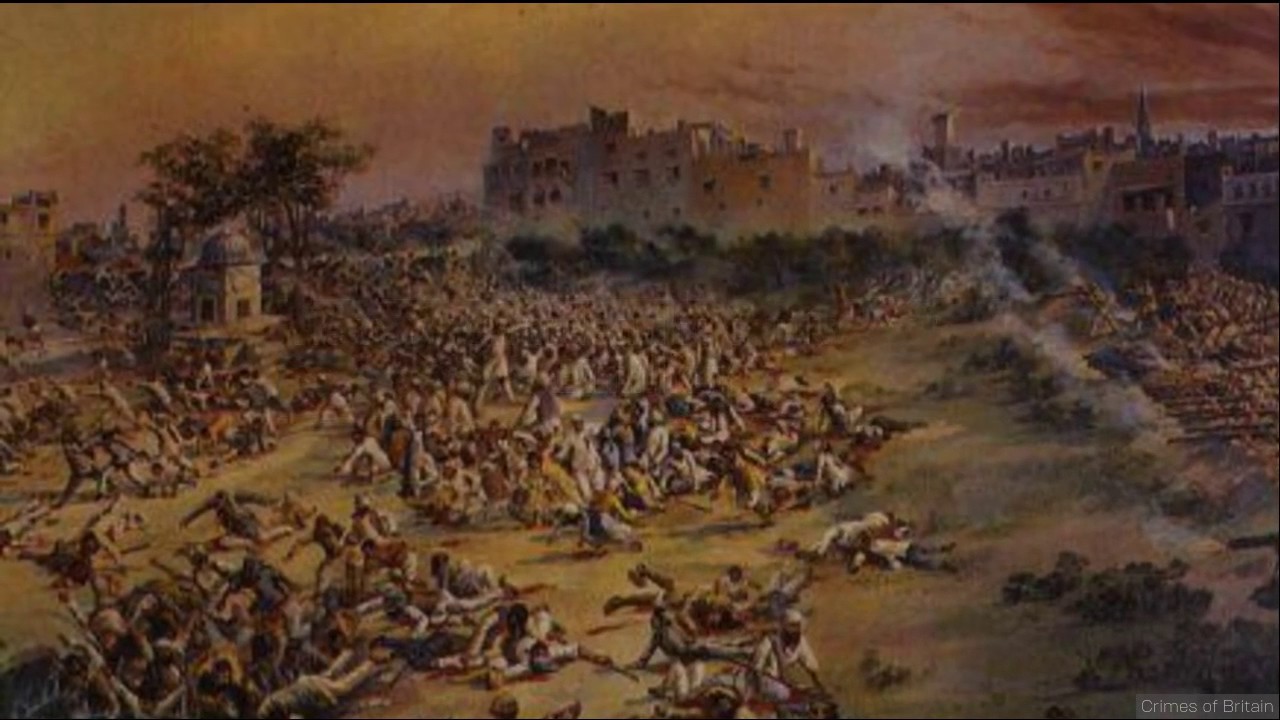
People died inside Jallianwala Bagh. They were killed. Everyone was cut to pieces. Flowers, plants and people, all were injured. That night of general massacre in Amritsar was so gruesome that corpses were strewn everywhere in Jallianwala Bagh. A horrifying silence overshadowed the Bagh and its environs.
General Dyer of the British government established an unforgettable example of favouring wanton injury with this bloody incident. He made no arrangements for the dead and injured; according to him, ‘This was not his job.’ So there was no arrangement at the government level for lifting unburied and unshrouded corpses and conveying medical aid to the injured.
Only the social welfare organization Sewa Samiti did a bit of work by shifting a few injured to hospital with the permission of General Dyer. Curfew had been imposed in Amritsar and nobody was permitted to go outside after 8 pm. Even the relatives of those who had died could not pick the bodies of their slain ones; and neither the Sewa Samiti was allowed after that time to shift the dead and injured to their destination.
There was hardly a drop of water for the injured in the Bagh. They were moaning lying on the earth, bodies bruised and lips crusted with dryness. The dead youth, aged, women, children were lying moist in their own blood. Dogs were barking and wild animals were lying in wait on the walls when to make a meal out of them.
It is said that young Ratan Devi who had come to celebrate Baisakhi with her husband, guarded her husband’s corpse all night with a bamboo stick so as to protect it from the tearing of wolves and dogs. There were two men and a boy of 12 years lying near her weary with wounds and were pleading with her not to leave that place. She also helped a man with Jaat-like features in climbing the wall. There were heaps of corpses lying everywhere at the feet. That fearless woman spent the whole night there.
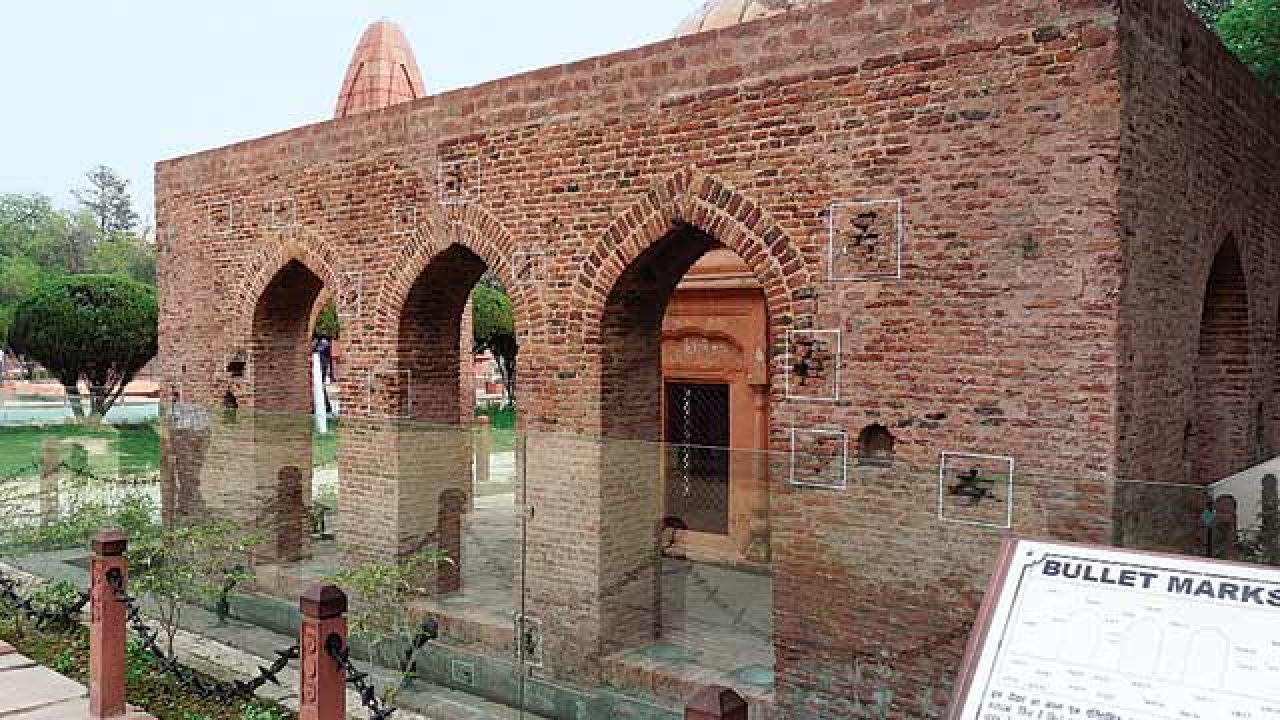
What great punishment was meted out to that rebel city. The historic tale of general massacre which the British General Dyer recorded, within it as a result of uninterrupted indiscriminate firing for 15 minutes on unarmed people, 399 people were killed and more than 2000 were wounded; in which 41 young boys and an infant were also included. This firing ceased when the soldiers ran out of ammunition. At least 1650 rounds were fired in this duration. These were the numbers of the official report and according to the figures collected unofficially the number of the dead was between 500 and 600 and that of the wounded was near 3000.
Due to the imposition of Martial Law and censorship of newspapers, accurate news was not reaching the other parts of the country. But when the truth was known, the whole of India became a veritable protest ground from head to foot. A great protest camp was set up in Jallianwala Bagh and there began a series of swift arrests in succession. In this reference, Manto has mentioned the protest camps in Jallianwala Bagh and the enthusiasts of freedom giving themselves up for arrest in his short story Swaraj ke Liye and has painted that situation orally through the characters. He himself also kept participating in that protest.
Even after the horrible incidents of Amritsar, Lord Chelmsford and Michael O’Dwyer did not bother to visit Amritsar. Although the British Government appointed an investigative commission under the chairmanship of Lord Hunter, a member of the House of Lords, whose ambit was to appraise and enquire into governmental injustices in Punjab during Martial Law.
Simultaneously, the Congress appointed its own investigative commission under the chairmanship of Motilal Nehru. That crowd in Jallianwala Bagh was in no way a gathering of rebels, this much was confessed by General Dyer himself too in front of the Hunter Commission. The crux of the report compiled by the Hunter Commission was that there was no need for imposition of Martial Law in Punjab and the Commission also said that during the Martial Law the British administration has handed down sentences severer than necessary; but the Commission concurred with Michael O’Dwyer in that a situation of an organized rebellion in Punjab was created and in these circumstances greater punishments than usual were essential in order to crush the rebellion. But Lord Montagu did not agree with this argument; he said that General Dyer had no authority to punish peaceful and unarmed people gathered in Jallianwala Bagh so severely.
The editor of the Morning Post newspaper collected a donation of 30,000 British pounds from the British public so that General Dyer should be rewarded for services to the British Empire and most of the members of the Conservative Party and several members of the House of Lords established an organization to defend General Dyer so that arrangements should be made to save the General from any possible punishment. The Army Council of Britain which had taken up the responsibility of defending General Dyer’s case, requested that this bloody General should be punished merely by awarding him half-pension after retirement. The Army Council also said that General Dyer had committed only an error of proportion in Jallianwala Bagh; and the Court of Justice of Britain afterwards even exonerated Dyer of this accusation, who had, with his “accomplishment” decorated the forehead of Manto’s ancestral city Amritsar with a pride-worthy wound like Jallianwala Bagh.
Note: All the translations from the Urdu are by the writer.
The English administration flogged the people and made arrests. After Amritsar, the greatest hardship came in Lahore. The Chief Administrator of the Martial Law General Johnston had the agitators flogged even there. Meanwhile, 500 students and teachers were arrested in Lahore and they were taken on foot to the Shahi Qila as punishment and then political leaders Pandit Rambhaj, Hari Krishan and Duni Chand were expelled from the district. In Lyallpur (now Faisalabad), the mob of people set fire to the Railway Station, and godowns of Cotton Mills.
As retribution for this protest, all the students of a school in Lyallpur were taken to stand in the ground outside the office of Major Smith. The hands of most of them were tied behind their back, they were asked to pass in a line with bowed heads in front of the major and salute the Union Jack and they had to submit to this order. In Gujranwala people witnessed a strange sight in the morning.
A headless calf was tied to one side of the Railway Station while a dead pig was hanging on the other side. This was a tactic to inflame the Hindus and Muslims, and this was the administration’s doing. So the inflamed mob, which included both Hindus and Muslims set fire to the Railway Station; destroyed the telecommunications system. English administration sought the services of the air force. The planes of the air force bombed Gujranwala and neighbouring villages. A military division fired machine guns to disperse those protesting inside and outside the Railway Station. Similarly, the reaction of the circumstances in Amritsar also occurred in other cities of Punjab. Martial Law had been imposed in five districts of Punjab.
On April 12 the Lieutenant-Governor of Punjab Michael O’Dwyer apprised the Indian government in Simla via telephone about the conditions. In response, it was said, “Even if the army has to fire bullets to control the situation, restraint should not be practiced. An example should be set as to the consequences for rebellious activities”. Therefore as per a government order on April 12 Governor O’Dwyer prohibited all kinds of gatherings and meetings. They had information about a big gathering of Indians in Jallianwala Bagh.
The day was April 13. Given the circumstances in the city, the business of life was suspended. People were all but besieged in homes. Manto’s father was just about to go outside by the big door while giving instructions to the former not to leave the house, when the servant came and informed that despite the Governor’s clear declaration, a public meeting was to be held in Amritsar near the evening.
This was terrifying news, which scared them. The flights of airplanes in the air, the patrols of armed police in the bazaar, the state of sadness on the faces of people, the arrival of bloody storms were the premonition of some horrible calamity. He was thinking about postponing the thought of going outside when the din of airplanes rose, as if several humans are groaning in harmony with the intensity of pain.

Hearing the din of planes, Manto ran out of the room carrying his air-gun and began to look towards the sky above in hope that should they drop any cannon, he would shoot them down with his air-gun. At that moment, an iron determination was evident on his innocent face. But the plane instead dropped some things from above which bore resemblance to pieces of paper. As soon as they dropped, these pieces flew in the air like moths; then came very near and began to drop in streets, houses and rooftops. A few of these papers also dropped on the upper rooftop of Manto’s home. Manto scampered upstairs and brought back that paper.
‘Abba jan….The plane folks have dropped these slips instead of cannons.’
Ghulam Hasan Manto taking those papers began reading them; they were government advertisements. It was clearly mentioned that the government has not permitted to hold the gathering; if they hold a meeting of their free will, the people themselves will be responsible for the consequences. Ghulam Hasan turned pale. Now he could clearly visualize the picture of the impending calamity. Manto looking at his father, who appeared surprised and worried after reading the advertisement, asked in fear, ‘What is written on them?.....’
‘Saadat, go away now…go play with your gun!’ the father said.
‘But what is written on it Abba jan?’

‘It’s written that there will be a show in the evening today’, Ghulam Hasan said to his son in order to delay the matter.
‘There will be a show! Then I will go too.’
‘What did you say?’
‘Can’t I go to this show with you?’
‘Fine I will take you…now go play’, Ghulam Hasan said, afraid to extend the conversation any further.
‘Play where…you don’t let me go outside. Mother and sister do not play with me. My classmate Tufail does not come these days. Who should I play with now? We will definitely go see the show in the evening, right?’
Manto went inside without waiting for an answer and wandering around in the rooms went to the sitting room of his father and began to look outside the window. He saw that the shops in the bazaar were closed indeed but people were going to and fro today. But he was thinking why were the shops closed? Perhaps people have closed their shops in order to see the show, the advertisements for which the plane had dropped. It must be some big show. The very thought made Saadat very restless. He could see people were coming and going. He began to wait with baited breath for the time of evening.
People were coming and going in the bazaars. It was the festival of Baisakhi that day. Even in those very chaotic days, people were gathering in Amritsar from near and far because every year the mela of Baisakhi was celebrated with great fervor and festivity. Manto had not been out to play for the last two to three days. That is why he also never found out from his age mates that the Baisakhi fair was coming.

The family-members too did not mention it since he would insist on watching it. The circumstances were not suitable and nobody really knew whether the mela would even be held or not? English historian (Arthur) Swinson has written that ‘That day thousands of people were gathered in Jallianwala Bagh.
There was a festive scene and people were joyously celebrating the festival. Several were lying on the grass of the Bagh. Many were busy playing cards and there were also a lot of people who were busy in fun and sport along with their children and these latter were aged from three to twelve years.’ The garden was gradually getting busier. There were police check-posts on the city routes.
Armed white soldiers were standing at the entrance of the bazaars but people were arriving from everywhere. There were only four narrow gates for entry into the Bagh, which were being guarded lest the evildoers enter. Voices of roaring shouts could be heard. These groups were stopped by the administration with the help of cudgels. Jostling kept increasing at the entry gates. There were protesting cries.
The armed soldiers tried to stop them but the fear and harassment had now disappeared from their faces and instead blood and passion had emerged. At some places these were blossoming in heart-shaking voices. There was a sea of humans inside the Bagh. The dust rose from the feet and hovered over the heads. There was a noise of people and a state of confusion was about.
The Muslims were entering shouting the name of their God and religious leaders and the Hindus and Sikhs displayed passion and fervor calling out to their gods and leaders. This crowd was now getting out of the control of the administration. At a raised position, a Hindu leader addressed. The die-hards repeatedly chanted slogans.
Then a Muslim leader addressed the people from that platform. The English officers having failed in administrative matters were looking angrily at that black-bearded man who was addressing the people by gesturing and screaming. A gora appeared behind him who wore a military officer’s uniform. He threw that black-bearded one down by pushing him and began to say something to the people gesturing in a similar manner.
Silence dominated for a moment and the extremely angry voice of that gora roared. No one could actually understand what he said but it was evident from his gestures and postures that he was asking the crowd to leave and disperse.

Suddenly a noise rose against him. His voice was drowned. Some crazy man in the crowd took his shoe off and threw in his direction. Then a sudden assault of shoes began from many directions. Alongside, this really huge crowd was also moving. After the shoes, a barrage of balls made out of pagris, shirts and vests ensued. Several people became half-naked, having undressed to fling their clothes at the police authorities.
There was a noise which both the crowd and those army officers were making together. At that time, there must have been 20-25 thousand people in the Bagh. In all four directions of the Bagh, there were high-rising houses, and to enter the high walls of which there were four narrow routes. In the meanwhile, General Dyer entered the Bagh along with his army. The armoured military cars were left outside since they could not enter through these narrow gates. All the routes to the exit, the gates through which the army entered, were closed. It took positions as soon as it reached and immediately loaded the machine guns with bullets as ordered by General Dyer. Swift winds were dissolving into storm. Red winds brought a message of the impending bloody calamity.
The whole city was wrapped in an unknown fear. Ghulam Hasan Manto and his wife were sitting silent in the courtyard of the house. Their son was gazing at them with silent looks sitting with his sister on the charpoy. There was a whistle-like voice in the swift wind.
Trr, trr, trr, trr…
The colour of Saadat’s father’s face became white like paper upon hearing these voices.
He could only manage to utter…’Bullet…’ Saadat’s mother could not utter a single word. The very mention of a bullet had terrorized her. She stood up; so did her daughter. Both went into the room one after the other. Saadat got up from the charpoy and approaching his father held his finger, saying, ‘Abba, get up let’s go the show has begun.’
‘What show?’ Maulvi Ghulam Hasan said in a stern tone.
‘The show about which the slips were advertising in the morning. The mela has begun, you hear the noise of these crackers, right?’
‘There’s still a lot of time. No need to hurry’, the father said, concealing his fear. ‘Now go study inside the room with your sister.’

Saadat went towards the kitchen with a disappointed face. Not finding his mother there, he went to his mother and sister in the other room. The firing was going on unhindered, which Saadat thought was the noise of crackers. Over there in Jallianwala Bagh, death was roaring. A scene had begun there, which is rarely to be seen in life. A panic had spread throughout the Bagh and there was chaos.
The crowd was now running here and there in a state of panic; this was a strange sight, no one knew about the other; everyone was running here and there to save their lives. There was a state of hue and cry in the Bagh. The running men targeted by bullets somersaulted in the air; as if they were clowns in a circus falling down during a performance.
The ones who died had the same passion and they would even not be rendered repulsive to sight after death because they hardly even had an idea about death. A strange death ruled. People fell, balanced, and then collided with each other but the pursuing bullets ran much faster than humans. Heaps of those who died and were injured lay at several places in the Bagh and when people headed towards the narrow exit gates, they would have to face a hail of bullets there. The poor souls would fall, injured by the bullets then would try to raise their heads but in the meanwhile would be all but buried under dozens of other injured ones. The white soldiers were firing continuously. Thousands of such people who were disappointed at being unable to leave the Bagh through the exit gates tried to scale the walls. Although at some places these walls were 7 feet high and at others 10 feet. There were many who were successful in clinging to them and were trying to outdo one another in finding a spot above; trying to climb upwards stepping on one another. The army bullets did not even spare them. There was a well towards the left of the Bagh. People running there fell into it. People coming from the other direction fell on them. Then living and semi-dead people coming from everywhere kept falling. Human screams were roaring in the well.
Afterwards while sitting on the capstone of this well Saadat Hasan Manto had felt that incident with his heartbeats and the eye of his imagination and chronicled it. The atmosphere of the Bagh was still roaring with the vibration of bullets and the hue and cry of the running people in his ears. Manto has written in his short story Deevana Shayir, ‘The rustle of dry leaves beneath my footsteps was making a sound like the breaking of dried bones. I felt on every step as if countless corpses are lying on the evergreen bed of grass. I quickened my steps and with beating heart sat on the platform that was constructed around the well.’ While sitting at that well he had met an insane poet who was aggrieved over that injustice and was reminding about that bloody incident.
Manto said to him, ‘I was young at the time of this incident so very foggy traces of it remain in my mind. I have a lot of respect in my heart for these people who had sacrificed their lives for their motherland and passion for freedom. Bullets were raining Trr trr. People were dying over each other fleeing everywhere in horror. Death is gruesome but oppression is many times more terrifying and gruesome!!!’
There were bullet marks on the wall in front of the well and the broken square latticed window. These innumerable marks on the walls seemed as if thousands of bloody eyes are watching. The legs of many men hanging by the walls around the Bagh were turned inwards and the heads and arms were clinging outwards on the corner at the edge of the wall. The Gurkha soldiers had kept them within the hail of bullets from every position. They were those unfortunate ones who had climbed above to scale the wall viewing it to be of a lower height from that point; coming in the range of bullets and upon viewing from the inside appeared as if the dhobi had spread out many different kinds of clothes to dry.
Those who unhesitatingly went out the narrow gate, ripping through the soldiers’ positions in the chaos were being fired upon from the rear. There was a river of human bodies flowing from the Bagh to the bazaar. Those poor ones who avoided the range of bullets had to cross the 25-yard piece of land that went towards the Sabzi Mandi crawling on the ground on their bellies. They were not even allowed to utilize elbows or knees for the purpose. It had been made a law that the people should cross by moving like a snake on their bellies here, where their white women had been treated like a snake. There a row of soldiers taking position were ready to fire bullets all the time. Whoever rose on their elbows would be shot.
Then another tactic was used that bullets were continuously fired a foot or half-foot above the crawling bodies and the people saving their lives stuck their heads in the ground and began to crawl on their toes aided by nails. Whoever got the opportunity would join this crawling crowd of serpents by falling on his head.
Even then some blind bullet would hit a skull and the head sunk in the earth would leave behind a wide line of blood. Despite that, people continued passing by lying down, which was an extremely improper. This was the only single way after getting out of the Bagh safe and sound.
Far in the distance inside the lane from Fareed Chowk, Saadat was looking outside from his window. Evening was setting in. The bazaar was deserted except for the sound of the wind. After momentary pauses, the noise of bullets could be heard, which also included painful voices of humans; though these screams were far from Saadat’s hearing. Suddenly he heard the sound of someone moaning within the silent scene of the window. He was trying to see in an amazement and a quest when a boy was seen coming from the chowk, screaming, running, stumbling; then stumbled badly at the exact opposite to their house and fell. He was injured. Saadat became really scared at this sight, ran to his father and said, ‘Abba abba someone has fallen there in the bazaar. He is also bleeding.’

Upon hearing this Ghulam Hasan Manto went to the window and saw that indeed a young boy was lying outside face-down. He had a wound on his calf from which a lot of blood was oozing. But he did not have the courage to go near and help him. He knew too well the horrible conditions outside. The light of some home was lying unconscious, helpless and it occurred to no one to pick up the boy from the road and lay him down on the platform of the shop in front. He remained there gasping, dying.
‘Abbajan, has someone hit that boy?’
The father shut the window and went into the room nodding in assent…. The noise of bullets coming from the direction of the Bagh had abated. Saadat stood thinking how much pain that boy would have felt from such a big wound. As once he could not sleep the whole night due to a prick from a pen-knife; and his parents had sat by his bedside. The moment this thought came to him he felt as if that wound was in his own calf and it had acute pain… his eyes became wet. When his mother came inside, she fondled him seeing him cry, asking, ‘My son why are you crying?’
‘Ammi has someone hit that injured boy?’ He was saying in a bittersweet voice, pointing a finger outside the window.
The mother had heard orally about the injured boy and the conditions outside from her husband. ‘He must have done something wrong’, the mother said to him changing the topic.
‘But in school a mischief or wrong is punished with a cane. It never bleeds’, Saadat said looking at his mother with uncertainty. ‘Won’t his father be mad at the teacher when he goes to the school; whoever has hit him so badly? One day when master sahib pulled my ears so hard that they turned red, Abbajan had gone to the headmaster to complain na?’
‘Bete! The master who hit him is a very powerful man.’
‘Is he even more powerful than Allah mian?’
‘No he is less powerful than Him.’

‘Do you know him?’
‘No…. leave this nonsense. It’s night-time. Chalo, let’s sleep’, the mother grabs his arm to take him to the other room to his sister.
‘Allah mian! I pray that the master who has hit that boy, You punish him severely. Snatch such a cane from him which causes bleeding… I too haven’t memorized the tables. So I’m afraid lest my teacher too finds such a cane…if You do not listen to me, then I will be displeased with You too,’ Saadat was praying in his heart as he slept.
A few parts in the aforementioned narrative are derived from Saadat Hasan Manto’s first short-story Tamasha, which Manto witnessed as a kid as the Martial Law of 1919; that Martial Law which is a memorial of the bloody view of Jallianwala Bagh and the brutal tyrannies of General Dyer. There are merely two main characters in Tamasha: father and son (the child’s name in the short story though is Khalid but it is clear from study that it is Manto in the form of Khalid) The conversation in the form of a dialogue between a father and son in the aforementioned pages encompass the personality and psychology of Manto in every way.
In the plot of this short-story carrying the background of Jallianwala Bagh, the citizens of the city were protesting against the ruler of the time and the empire had resorted to extreme oppression and injustice against them. Due to this a strange silence descended over the city for many days in that who knows what might happen in the next moments? The child was asking the father to go see the show, when the sounds of bullets firing began to be heard in the city. Hearing these sounds, the father sent the child to the mother inside. Entering the home, the child saw from the window the injured boy falling outside the house. Saadat Hasan Manto says in the short story that although the boy was seriously injured and lying on the road, out of the fear of the ruler, neither the child’s father nor anyone else dared to help him or at least pick him from the road and lay him down on the platform of the shop where he could lie with comfort or if he had passed away, would have lain aside. Here, Manto indicates another social problem in that official vehicles are indeed used to shift unarmed and poor people to jail; not to shift some poor and injured innocent to the hospital or home, someone who because of the oppression and injustice of these very rulers is staring death in the face. Someone’s son, an apple of someone’s eye, was taken and he was lying dead on the road, targeted by bullets. The death of that young man in such a state was a horrible shape of the cruel bullets in pursuit of the innocent and guiltless.

People died inside Jallianwala Bagh. They were killed. Everyone was cut to pieces. Flowers, plants and people, all were injured. That night of general massacre in Amritsar was so gruesome that corpses were strewn everywhere in Jallianwala Bagh. A horrifying silence overshadowed the Bagh and its environs.
General Dyer of the British government established an unforgettable example of favouring wanton injury with this bloody incident. He made no arrangements for the dead and injured; according to him, ‘This was not his job.’ So there was no arrangement at the government level for lifting unburied and unshrouded corpses and conveying medical aid to the injured.
Only the social welfare organization Sewa Samiti did a bit of work by shifting a few injured to hospital with the permission of General Dyer. Curfew had been imposed in Amritsar and nobody was permitted to go outside after 8 pm. Even the relatives of those who had died could not pick the bodies of their slain ones; and neither the Sewa Samiti was allowed after that time to shift the dead and injured to their destination.
There was hardly a drop of water for the injured in the Bagh. They were moaning lying on the earth, bodies bruised and lips crusted with dryness. The dead youth, aged, women, children were lying moist in their own blood. Dogs were barking and wild animals were lying in wait on the walls when to make a meal out of them.
It is said that young Ratan Devi who had come to celebrate Baisakhi with her husband, guarded her husband’s corpse all night with a bamboo stick so as to protect it from the tearing of wolves and dogs. There were two men and a boy of 12 years lying near her weary with wounds and were pleading with her not to leave that place. She also helped a man with Jaat-like features in climbing the wall. There were heaps of corpses lying everywhere at the feet. That fearless woman spent the whole night there.

What great punishment was meted out to that rebel city. The historic tale of general massacre which the British General Dyer recorded, within it as a result of uninterrupted indiscriminate firing for 15 minutes on unarmed people, 399 people were killed and more than 2000 were wounded; in which 41 young boys and an infant were also included. This firing ceased when the soldiers ran out of ammunition. At least 1650 rounds were fired in this duration. These were the numbers of the official report and according to the figures collected unofficially the number of the dead was between 500 and 600 and that of the wounded was near 3000.
Due to the imposition of Martial Law and censorship of newspapers, accurate news was not reaching the other parts of the country. But when the truth was known, the whole of India became a veritable protest ground from head to foot. A great protest camp was set up in Jallianwala Bagh and there began a series of swift arrests in succession. In this reference, Manto has mentioned the protest camps in Jallianwala Bagh and the enthusiasts of freedom giving themselves up for arrest in his short story Swaraj ke Liye and has painted that situation orally through the characters. He himself also kept participating in that protest.
Even after the horrible incidents of Amritsar, Lord Chelmsford and Michael O’Dwyer did not bother to visit Amritsar. Although the British Government appointed an investigative commission under the chairmanship of Lord Hunter, a member of the House of Lords, whose ambit was to appraise and enquire into governmental injustices in Punjab during Martial Law.
Simultaneously, the Congress appointed its own investigative commission under the chairmanship of Motilal Nehru. That crowd in Jallianwala Bagh was in no way a gathering of rebels, this much was confessed by General Dyer himself too in front of the Hunter Commission. The crux of the report compiled by the Hunter Commission was that there was no need for imposition of Martial Law in Punjab and the Commission also said that during the Martial Law the British administration has handed down sentences severer than necessary; but the Commission concurred with Michael O’Dwyer in that a situation of an organized rebellion in Punjab was created and in these circumstances greater punishments than usual were essential in order to crush the rebellion. But Lord Montagu did not agree with this argument; he said that General Dyer had no authority to punish peaceful and unarmed people gathered in Jallianwala Bagh so severely.
The editor of the Morning Post newspaper collected a donation of 30,000 British pounds from the British public so that General Dyer should be rewarded for services to the British Empire and most of the members of the Conservative Party and several members of the House of Lords established an organization to defend General Dyer so that arrangements should be made to save the General from any possible punishment. The Army Council of Britain which had taken up the responsibility of defending General Dyer’s case, requested that this bloody General should be punished merely by awarding him half-pension after retirement. The Army Council also said that General Dyer had committed only an error of proportion in Jallianwala Bagh; and the Court of Justice of Britain afterwards even exonerated Dyer of this accusation, who had, with his “accomplishment” decorated the forehead of Manto’s ancestral city Amritsar with a pride-worthy wound like Jallianwala Bagh.
Note: All the translations from the Urdu are by the writer.
